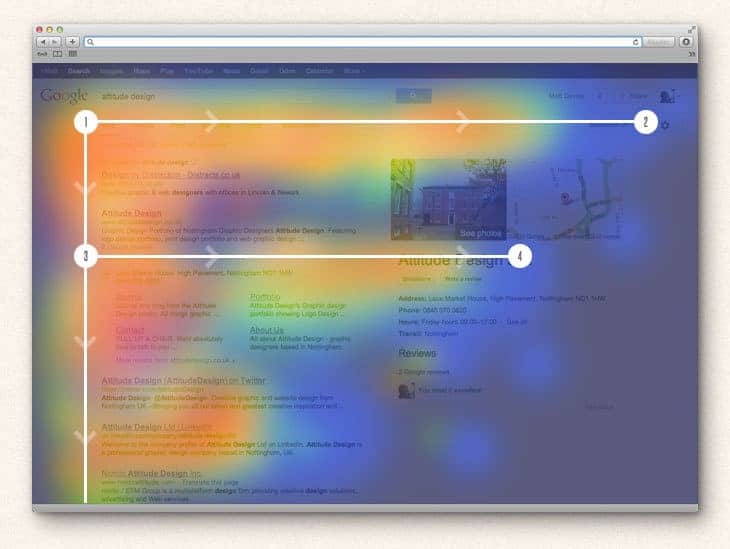Even before the invention of E-readers, people have speculated about a world in which books have become obsolete. This isn’t going to happen any time soon (or ever). But that doesn’t mean that E-readers and the culture of the Internet in general aren’t taking a toll on our reading practices.
The Culture of Summary: The F-Pattern
![]() Being children of the Internet means we’ve become a culture of summary. Addicted to endless scrolling, our eyes scan but rarely linger long. We may see the forest—but the trees? Not so much. Slow it down. Mark it up. Take it in. Studies have shown that our eyes, when reading text online, work in an F-pattern. We may read the first line, but beyond that, we’re scanning the left margin and darting our eyes to the right to scan a line every so often. Pretend every text is your father’s will! Pretend it’s a love letter from a faraway soldier. Read it closely.
Being children of the Internet means we’ve become a culture of summary. Addicted to endless scrolling, our eyes scan but rarely linger long. We may see the forest—but the trees? Not so much. Slow it down. Mark it up. Take it in. Studies have shown that our eyes, when reading text online, work in an F-pattern. We may read the first line, but beyond that, we’re scanning the left margin and darting our eyes to the right to scan a line every so often. Pretend every text is your father’s will! Pretend it’s a love letter from a faraway soldier. Read it closely.
E-readers Mean Less Retention
As you might suspect, scanning and scrolling and summarizing means we walk away with a rather foggy idea of what it was we just absorbed. “It was about himself,” a student might remark of Whitman’s “Song of Myself.” “A man makes a monster,” they say, when asked to analyze Frankenstein. “Big brother is watching everybody,” of Orwell’s 1984.
But character names? Literary devices? The function of form? Important quotations? Moments of epiphany? Nope.
We’re more likely to retain information that we read in print versus digital information. To take it a step further, we’re more likely to retain information from print books we annotate. Even better, ones we annotate and read aloud. To retain something incredibly well? Copy it out onto a separate sheet of paper. Hunter S. Thompson did this with F. Scott Fitzgerald’s and Hemingway’s writing because he wanted to learn what made them masters.
Maybe it sounds lame to you, but in my mind, there’s nothing lame about being a better reader and thinker! Try out these techniques next time you’re writing a research paper. Don’t be afraid to mark up your books and to copy out passages. Your brain will thank you.
Digital Texts = More Distraction. CLICK HERE.
The Internet and e-readers are pretty much asking us to get distracted. Facebook’s just a tap away! Turn off your phone, place it in a random drawer, grab a physical book, find a physical nook, and read. Have a drink and a snack beforehand. Feed your pets before you do so.
E-readers Don’t Anchor Us in Place
Although they boast powerful search functions and the ability to save your place in a book, E-readers don’t afford you the physical sense of place that a print book does. There’s no feeling of “I’m almost finished!” that feeling the pages in your right hand dwindle elicits.
On the Flip Side…
Of course, there are advantages to reading digital text, and as a scholar, I’m fully aware of them. Less clutter, amazing search functions, PDFs of hard-to-find journal articles—you name it. What’s more, digital text, such as blog posts like this one, have the potential to reach a vastly wider audience. Studies have also shown that math and science students prefer E-readers for their textbooks, and I totally understand why. The same studies, however, have shown that humanities students will still buy physical copies of their books even when they can access digital copies of those books online for free.
The Final Word
Books aren’t dying. Bookstores are (thanks, Amazon). Go find an independent bookstore and get reading!
